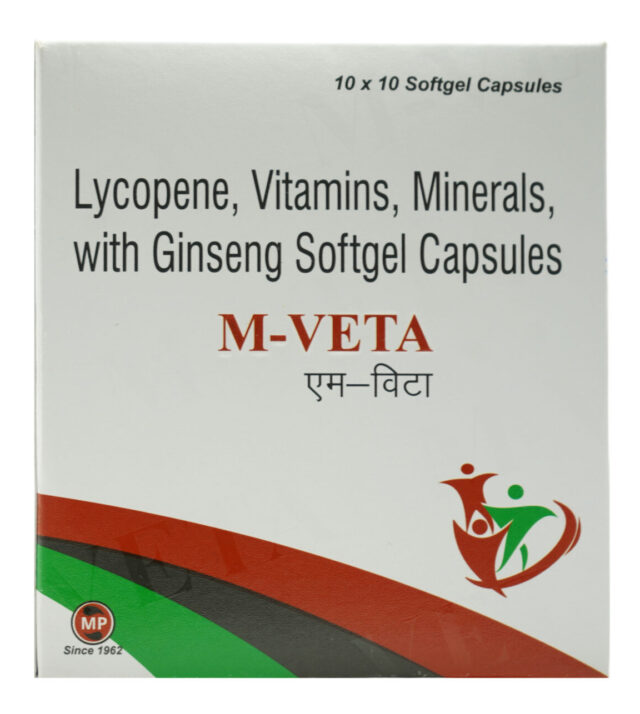
M-Veta
(Lysopene, Multivitamin, Multiminerals with Ginseng softgel)
About M-Veta
M-Veta used dietary supplements that are often taken for their potential health benefits. Here’s some information about each of these components:
-
Lycopene is a naturally occurring pigment that belongs to the carotenoid family. It is found in abundance in certain fruits and vegetables, particularly tomatoes. Lycopene is known for its antioxidant properties, which means it helps protect the body’s cells from damage caused by harmful molecules called free radicals. Some studies suggest that lycopene may have potential health benefits, including reducing the risk of certain cancers, heart disease, and age-related macular degeneration. However, more research is needed to confirm these benefits.
-
Multivitamins: Multivitamins are supplements that contain a combination of different vitamins and sometimes minerals. They are designed to provide a convenient way to supplement the diet with essential nutrients that may be lacking in one’s regular diet. Multivitamins typically include a broad spectrum of vitamins, such as vitamin A, B-complex vitamins (B1, B2, B3, B6, B12), vitamin C, vitamin D, vitamin E, and vitamin K. Some multivitamins also contain minerals like calcium, magnesium, iron, zinc, and selenium. The specific composition of multivitamins may vary among different brands and formulations.
Multivitamins are commonly taken to support overall health and well-being. They can help fill in nutrient gaps, especially for individuals who have restrictive diets or difficulty obtaining all necessary nutrients from food alone. However, it’s important to note that multivitamins are not a substitute for a balanced diet, and it’s generally recommended to obtain nutrients primarily from whole foods.
- Multiminerals: Multimineral supplements, as the name suggests, contain a combination of various essential minerals. These may include minerals like calcium, magnesium, iron, zinc, selenium, copper, manganese, and others. Minerals are important for various bodily functions, such as bone health, nerve function, immune support, energy production, and maintaining proper fluid balance.
Taking a multimineral supplement can be beneficial if you have a deficiency in certain minerals or have increased nutrient needs due to specific circumstances, such as pregnancy, intense physical activity, or medical conditions that affect nutrient absorption. However, it’s important to note that excessive intake of certain minerals can be harmful, so it’s best to consult with a healthcare professional to determine if a multimineral supplement is appropriate for your specific needs.
When it comes to combining lycopene, multivitamins, and multimineral supplements, it’s generally safe to do so. However, it’s always recommended to consult with a healthcare professional before starting any new supplements, especially if you have any underlying health conditions or are taking medications, as they can provide personalized advice based on your individual circumstances.
Dosage of M-Veta
M-Veta is important to follow the dosage instructions provided on the label of any dietary supplement product, including a product that contains lycopene, a multivitamin, and multiminerals. The recommended dosage may vary depending on the specific formulation and the age and needs of the individual.
It is generally recommended to start with the lowest dosage and gradually increase if needed. It is also a good idea to speak with a healthcare provider before starting any new supplement regimen, as they can provide guidance on the appropriate dosage and help ensure that the supplements will not interact with any medications or underlying health conditions.
It is also important to keep in mind that dietary supplements are not intended to be a sole source of nutrition and should be used in conjunction with a healthy and balanced diet.
Side effect of M-veta
Like any other dietary supplement, a product containing lycopene, a multivitamin, and multiminerals may have potential side effects. However, the specific side effects will depend on the specific formulation and the individual taking the supplement.
Some common side effects of multivitamins can include stomach upset, nausea, diarrhea, and constipation. These side effects are usually not serious and can often be relieved by adjusting the dosage or taking the supplement with food.
Lycopene is generally considered safe when taken in the amounts found in food. However, large amounts of lycopene supplements may cause digestive side effects such as nausea, diarrhea, and gas.
Multiminerals may also cause side effects, depending on the specific minerals they contain. For example, high doses of calcium supplements may cause constipation, while high doses of iron supplements may cause stomach upset and constipation.
It is important to speak with a healthcare provider if you experience any side effects while taking a dietary supplement. They can help determine the cause of the side effects and provide guidance on how to manage them. It is also important to report any side effects to the FDA through their MedWatch Adverse Event Reporting program.

